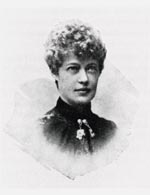Alma Åkermark

Alma Mathilda Åkermark (11 June 1853, Forshälla parish – 4 June 1933, Oscar Fredriks parish) was a Swedish editor, feminist, writer, journalist and women's rights activist. She was a co-founder of the radical feminist women's paper
Life
Alma Åkermark was the daughter of the Gothenburg merchant Anton Wilhelm Åkermark and Kristina Kristiansson and sister of the painter Isak Åkermark. Her family was acquainted with the family of the progressive politician and publisher Sven Adolf Hedlund. When she lost her father at the age of sixteen, Hedlund gave her financial support to study music and drawing in Neuchâtel in Switzerland, and upon her return to Sweden in 1881, she supporter herself as a teacher in these subjects at the Fruntimmersföreningens flickskola.
Through the Hedlund family, she belonged to the progressive circles in Gothenburg. In 1884, the Gothenburg's Women's Association, the first women's organization in Gothenburg, was founded with Hedlund's daughter Mathilda Hedlund as chair. Åkermark was elected board member the following year.
Framåt publication
In 1886, Alma Åkermark,
Alma Åkermark was a radical social liberal who supported social reforms and encouraged the paper to be a center of public debate. She controversially participated in the contemporary
In 1886, she published the novel
Later life
She left Gothenborg with her spouse and started a new magazine in Nystad in Finland, Nya Tag ('New Efforts'), which only lasted four months. After the death of her spouse in 1891, she was affected by a depression, and returned to Gothenburg, where she was placed in a mental asylum in 1892. Upon her release in 1896, she left for the United States, where she worked as a pattern instructor for a factory in Chicago. In 1909, she became blind and returned to Sweden, where she was cared for by her relatives.
References
- ^ a b "skbl.se - Alma Mathilda Åkermark". www.skbl.se. Retrieved 2019-09-11.
Sources
- http://www.ub.gu.se/kvinn/portaler/kvinnotidskrifter/biografier/akermark.xml
- Bergenheim, Åsa, Alma, sedligheten och det fria ordet. Ingår i: Obemärkta. - Stockholm, 1995. S. 162–198.
- Hirn, Yrjö, Alma Breinholm-Åkermark. - Ingår i: Den förgyllda balustraden. Stockholm, 1953. S. 25–58.
- Nyström, Per, Bannlyst: Alma Åkermark och det moderna genombrottet. Ingår i: Tre kvinnor mot tiden. Stockholm, 1994. S. 167–187.
- Kvinnornas tidning nr 17, 1925
